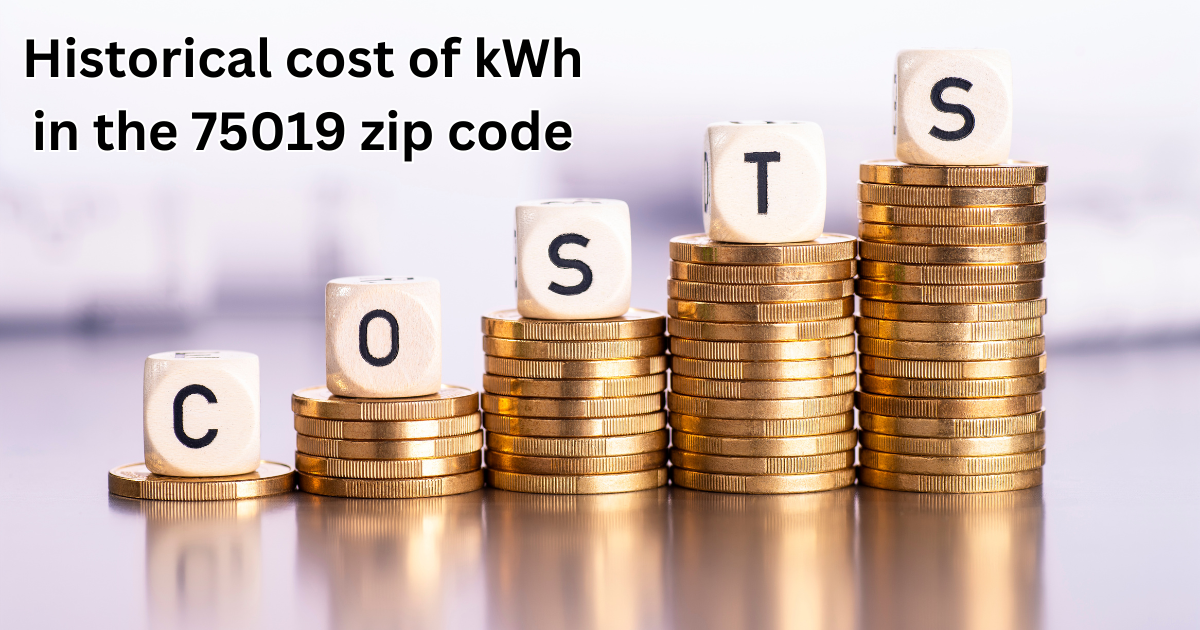Understanding energy pricing is crucial for residents and businesses in any area, and the 75019 zip code—covering Coppell, TX—is no exception. The historical cost of kWh in the 75019 zip code has significant implications for household budgets and business expenses alike. For residents in Coppell, this cost has seen various fluctuations over the years due to a range of factors including supply and demand, economic conditions, and regulatory changes. The 75019 zip code, known for its vibrant community and economic activity, reflects broader trends in energy pricing while also showcasing unique local characteristics. This article aims to delve deeply into the historical cost of kWh in this region, providing a comprehensive overview of how pricing has evolved and what factors have influenced these changes.
Understanding kWh: The Unit of Energy Measurement
Kilowatt-hours (kWh) are the standard unit for measuring electrical energy consumption. A kWh represents the amount of energy used if a device with a power rating of one kilowatt is operated for one hour. This unit is crucial for understanding electricity bills, as it reflects the total energy consumed over time.
In practical terms, if you run a 100-watt light bulb for 10 hours, you will use 1 kWh of energy. Electricity providers use this measurement to calculate costs, making it essential for consumers to grasp its implications for their monthly bills. The cost of kWh directly influences the total expense on electricity bills, making it a critical factor for financial planning in households and businesses.
Factors Influencing the Cost of kWh in 75019
Several factors influence the cost of kWh in the 75019 zip code, including supply and demand dynamics, energy sources, and local economic conditions. The primary factors include:
- Energy Supply and Demand: Fluctuations in energy supply and demand can lead to changes in kWh pricing. For instance, during periods of high demand, such as extreme weather conditions, prices may increase.
- Energy Sources: The mix of energy sources, including fossil fuels, nuclear power, and renewables, affects pricing. Areas with a higher proportion of renewable energy may experience different pricing trends compared to those reliant on fossil fuels.
- Local Economic Conditions: Economic factors, including changes in local industries and employment rates, can impact energy pricing. A booming local economy might lead to higher energy demand and subsequently higher prices.
Historical Overview of Electricity Prices in Texas
Electricity prices in Texas have experienced notable shifts over the past two decades. Historically, the state’s electricity market was regulated, with prices controlled by government entities. However, the deregulation of the energy market in the late 1990s and early 2000s introduced competition among providers, leading to significant changes in pricing structures.
In the early 2000s, deregulation allowed consumers to choose their electricity suppliers, which led to increased competition and variations in pricing. This shift aimed to benefit consumers through competitive rates but also introduced volatility in energy costs. Understanding these historical trends provides insight into the evolving cost of kWh in areas like the 75019 zip code.
Energy Deregulation and Its Impact on the 75019 Zip Code
Energy deregulation in Texas, enacted to foster competition and reduce prices, has had a profound impact on the 75019 zip code. Before deregulation, the state had a vertically integrated system where a single company managed generation, transmission, and distribution of electricity. Post-deregulation, the market was opened to competition, allowing multiple retail electric providers to offer various plans.
For consumers in the 75019 area, this transition meant access to a range of pricing options and plans. While deregulation aimed to lower costs, it also introduced variability in pricing based on market conditions and provider competition. As a result, residents and businesses in Coppell have experienced fluctuating electricity costs influenced by both local and broader market dynamics.
Analyzing Yearly Trends in the Cost of kWh (2000-2023)
Examining the yearly trends in the cost of kWh from 2000 to 2023 reveals a complex picture of energy pricing. In the early 2000s, deregulation led to initial price fluctuations as the market adjusted. By the mid-2000s, prices stabilized somewhat but remained subject to changes due to factors such as fuel costs and regulatory adjustments.
The 2010s saw a mix of rising and falling prices, influenced by technological advancements in energy production and changes in global energy markets. The most recent years have been marked by volatility due to events such as the COVID-19 pandemic and fluctuations in energy supply chains. Understanding these trends helps contextualize the historical cost of kWh in the 75019 zip code and provides insights into future pricing expectations.
Historical Cost of kWh in the 75019 Zip Code: 2000-2010
From 2000 to 2010, the cost of kWh in the 75019 zip code experienced notable changes, reflecting broader trends in Texas energy pricing. The early 2000s were characterized by the initial impacts of deregulation, with prices fluctuating as the market adjusted to increased competition and new pricing structures.
During this period, economic factors such as rising fuel costs and infrastructure investments also played a role in shaping electricity prices. By the late 2000s, prices began to stabilize somewhat as the market found a new equilibrium, though occasional spikes were influenced by external factors such as global energy markets and regional weather events.
Historical Cost of kWh in the 75019 Zip Code: 2010-2020
The decade from 2010 to 2020 saw significant developments in energy pricing in the 75019 zip code. Advances in technology, including the growth of renewable energy sources and improvements in energy efficiency, played a crucial role in shaping pricing trends.
The early 2010s were marked by moderate price fluctuations, influenced by factors such as changes in fuel prices and regulatory adjustments. By the mid-2010s, the increasing use of renewable energy sources began to impact pricing, often leading to lower costs due to the decreased reliance on fossil fuels. However, the latter part of the decade experienced price volatility due to factors such as geopolitical events and changes in global energy markets.
Post-2020 Trends: How Global Events Have Affected Local Energy Prices
The period following 2020 has been marked by unprecedented events that have significantly impacted energy pricing. The COVID-19 pandemic led to economic disruptions and shifts in energy demand, affecting the cost of kWh in the 75019 zip code. With changes in energy consumption patterns and disruptions in supply chains, prices became more volatile.
Additionally, global events such as supply chain issues and geopolitical tensions have further influenced energy costs. The ongoing adjustments to market conditions and the push towards sustainable energy solutions continue to shape the pricing landscape, making it essential for consumers to stay informed about these trends.
Also Read: 5103402488
The Role of Renewable Energy in the Historical Cost of kWh
Renewable energy sources, including wind, solar, and hydroelectric power, have played an increasingly important role in shaping the historical cost of kWh. As Texas has invested more in renewable energy infrastructure, these sources have contributed to fluctuations in energy pricing.
In the 75019 zip code, the growth of renewable energy has generally led to more stable and often lower electricity prices, as these sources reduce dependence on fossil fuels. The impact of renewable energy is evident in the pricing trends observed over the past decade, reflecting a shift towards more sustainable and cost-effective energy solutions.
Seasonal Variations in Electricity Prices in 75019
Seasonal variations have a notable impact on electricity prices in the 75019 zip code. During peak seasons, such as hot summers or cold winters, the demand for electricity often increases, leading to higher prices.
For instance, summer months typically see higher electricity usage due to increased air conditioning, which can drive up prices. Conversely, during milder seasons with lower energy demands, prices may stabilize or decrease. Understanding these seasonal patterns helps consumers better manage their energy usage and budget accordingly.
Comparing the Historical Cost of kWh in 75019 with Other Texas Regions
Comparing the historical cost of kWh in the 75019 zip code with other regions in Texas reveals both similarities and differences. While energy pricing trends can be influenced by broader state and national factors, local conditions also play a significant role.
Regions with similar economic and climatic conditions may experience comparable pricing trends, while differences can arise due to variations in local energy sources, infrastructure, and regulatory environments. Analyzing these comparisons provides valuable context for understanding how the 75019 area’s energy costs fit into the larger picture of Texas energy pricing.
Utility Providers and Their Impact on Historical kWh Pricing
Utility providers have a significant impact on the historical cost of kWh in the 75019 zip code. The presence of multiple retail electric providers in the area offers consumers a range of pricing options and plans.
Different providers may offer varying rates based on their energy sources, operational costs, and pricing strategies. Understanding how these providers influence pricing helps consumers make informed decisions about their energy choices and potentially find more cost-effective options.
Government Regulations and Their Effect on Electricity Pricing
Government regulations play a crucial role in shaping electricity pricing in the 75019 zip code. Federal and state regulations impact various aspects of the energy market, including pricing structures, environmental standards, and market competition.
Local policies, such as incentives for renewable energy adoption or regulations affecting utility companies, also contribute to pricing changes. Examining these regulations provides insight into how they influence the historical cost of kWh and the broader energy market dynamics.
Energy Efficiency Programs and Their Impact on Historical Costs
Energy efficiency programs aim to reduce energy consumption and lower costs for consumers. These programs, which include initiatives such as rebates for energy-efficient appliances and incentives for home improvements, have played a role in shaping the historical cost of kWh in the 75019 zip code.
By promoting energy-saving practices and technologies, these programs contribute to overall cost reductions and can help stabilize pricing trends. Understanding the impact of these programs highlights their importance in managing energy costs and promoting sustainability.
Energy Consumption Patterns in the 75019 Zip Code
Energy consumption patterns in the 75019 zip code provide valuable insights into local energy pricing. Residential and commercial energy usage varies based on factors such as household size, business operations, and seasonal demands.
Analyzing these consumption patterns helps identify trends and influences on the cost of kWh. For instance, high residential energy use during summer months or increased commercial activity may impact pricing trends and highlight the need for targeted energy management strategies.
Historical Cost of kWh in the 75019 Zip Code: A Visual Timeline
A visual timeline of the historical cost of kWh in the 75019 zip code offers a clear representation of pricing trends over time. Graphs and charts illustrating yearly fluctuations and key milestones provide an accessible way to understand changes in energy costs.
This visual representation helps highlight significant events and trends that have influenced pricing, making it easier for consumers and analysts to interpret historical data and identify patterns.
What to Expect in Future kWh Pricing Trends in 75019
Predicting future kWh pricing trends in the 75019 zip code involves considering various factors, including technological advancements, market conditions, and regulatory changes. As the energy landscape continues to evolve, it is essential to stay informed about potential developments that may impact pricing.
Emerging trends such as increased adoption of renewable energy, advancements in energy storage, and changes in regulatory policies are likely to influence future pricing. Staying abreast of these developments helps consumers anticipate changes and make informed decisions about their energy usage.
Tips for Managing Electricity Costs in the 75019 Zip Code
Managing electricity costs effectively is crucial for both residents and businesses in the 75019 zip code. Practical tips for managing these costs include:
- Monitoring Usage: Regularly review your energy consumption to identify opportunities for savings.
- Comparing Providers: Explore different electricity providers and plans to find the most cost-effective options.
- Energy Efficiency: Invest in energy-efficient appliances and practices to reduce overall consumption.
Implementing these strategies can help manage electricity costs and make the most of available pricing options.
Conclusion
Understanding the historical cost of kWh in the 75019 zip code provides valuable insights into local energy pricing trends and factors influencing these changes. By examining past data and current trends, consumers and businesses can make informed decisions about energy usage and budgeting.
Staying informed about historical and future pricing trends is essential for managing energy costs effectively. This comprehensive overview highlights the importance of understanding how energy prices have evolved and the factors that continue to shape them, ensuring that consumers in the 75019 zip code are well-equipped to navigate the complexities of energy pricing.










